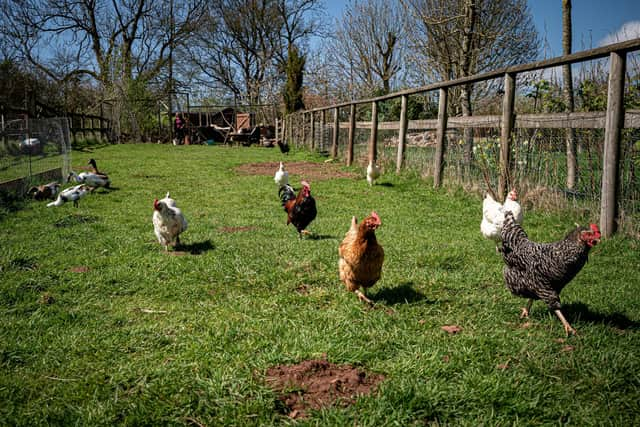New EU rules highlight the confusion, bureaucracy and economic impact of two markets within the UK
and live on Freeview channel 276
Yesterday, Stormont’s Windsor Framework committee discussed a new EU law on organic pet food – which will prevent divergence with GB and stop any future Northern Ireland producers working at a competitive disadvantage. But there are no such businesses here.
However, there are serious concerns for actual businesses which are affected by new EU organic standards. 14% of the organic eggs sold in GB come from Northern Ireland – and the Ulster Farmers Union recently warned that farmers won’t be able to absorb the costs of the new EU rules.
Advertisement
Hide AdAdvertisement
Hide AdBaroness Kate Hoey has warned that divergence will increase and local farmers will face unfair competition in the UK market.


The new rules highlight the confusion and bureaucracy involved in the UK being split into two regulatory zones. For example, Stormont’s agriculture department (DAERA) has an input into setting the UK standard for organic products – despite the UK standards not applying in Northern Ireland.
Officials are keen to avoid divergence within the UK, and this particular law does not create it. However, a committee in the House of Lords recently highlighted a threat to the organic egg industry from divergence between new EU laws in Northern Ireland and UK rules in Great Britain. The European Union has applied stricter standards to organic egg production – which could add five pence per egg to their production costs.
The DUP’s deal with the government guarantees access for NI products into the Great Britain market. However, it does not address competitive disadvantage if NI businesses have to operate to stricter EU standards.
Advertisement
Hide AdAdvertisement
Hide AdBaroness Hoey says the continuation of an Irish Sea border and NI being left under EU rules “means no certainty for businesses here as to whether they follow their own country’s regulations or have to follow those of a foreign jurisdiction - the European Union.
“Increasingly farmers for example will face unfair competition from GB producers who won’t have the EU bureaucrats ordering them around. Divergence from GB standards will increase. Each week we see more examples if this and proof that the Donaldson deal was worthless”.
Brian Ervine from DAERA told the Stormont committee on Thursday that EU standards apply to organic standards in egg, poultry and beef production here – and highlighted the importance of organic eggs supplying GB supermarkets.
He said that a new EU organic standard will apply in NI, while the old EU law applies in the rest of the UK, so there “there is a potential for divergence”.
Advertisement
Hide AdAdvertisement
Hide AdHowever, the specific law discussed on Thursday focuses on organic pet food – bringing it in to line with the requirements for organic human food and introducing some flexibility. The 95% ‘minimum organic ingredient’ standard already exists in GB – this new EU law would create alignment between the two regulatory zones within the UK.
The DAERA official told MLAs: "There don’t appear to be any downsides to this at all. In fact it would make sure that if there were producers of organic pet food in NI the impact of this act would align it with GB but would also align it with the rest of the EU” – and mean no competitive disadvantage.
There will also be different labelling in GB and NI on organic pet food – something highlighted by the DUP’s Jonathan Buckley. The Upper Bann MLA asked if there would be market restrictions for GB labelled goods entering NI. Officials said that the two standards are currently equivalent, so there won’t be an issue – and the goods could potentially benefit from the Windsor Framework regulations.
However, as reported by the News Letter in March, Northern Ireland producers won’t always be that lucky.
Advertisement
Hide AdAdvertisement
Hide AdIn evidence submitted to the Foreign Secretary Lord Cameron by the Lords Sub-Committee on The Windsor Framework – the UFU says costs created by new EU rules on eggs “cannot be absorbed by the NI industry”.
GB organic legislation is currently under review.
Comment Guidelines
National World encourages reader discussion on our stories. User feedback, insights and back-and-forth exchanges add a rich layer of context to reporting. Please review our Community Guidelines before commenting.